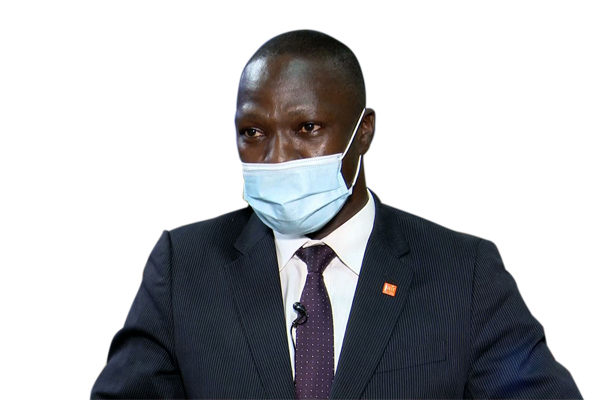Organic farming will bridge gap between rural and urban poor

Mr Chariton Namuwoza, the chief executive officer of the National Organic Agricultural Movement of Uganda. PHOTO | RAINHER OJON
Organic products mainly exported to the European Union fetch about $51m (Shs186b) only, in spite the large international market for Organic products estimated at over $100b (Shs366 trillion) annually. Prosper Magazine talked to Mr Chariton Namuwoza, the chief executive officer of the National Organic Agricultural Movement of Uganda (NOGAMU), on some of the major reforms within this sub sector.
Bring us to speed with the state of the organic sub sector?
Globally, the organic sub-sector continues to grow from strength to strength. According to the Research Institute for Organic Agriculture (FiBL), the global value of organic food exceeded the $100 billion mark for the first time in 2018. The US market takes the lead with over 41 per cent, followed by Germany (over 11 per cent) and France (over 9 per cent).
Several markets have posted double-digit growth rates. Though Uganda’s share of the Global Market Pie is still small (about $50 million as of 2018), it is projected to grow in the future, in light of the latest developments in the sub-sector. More interestingly, with 210,352 certified organic farmers (2018), Uganda is only next to India, as the world’s second country with the highest number of certified organic farmers.
Moreover, on the policy front, for the first time in the history of the sub-sector, the Government approved the National Organic Agriculture Policy (NOAP), which was launched in September, 2020.
This demonstrates government’s commitment to support the growth of the sub-sector within a regulated environment. Nogamu makes many inquiries about organic products from buyers, retailers and consumers, locally, regionally and globally.
There is also an upward trend in investments around organic farming and processing, especially of organic coffee, oil crops, herbs and spices (like vanilla), fruits and vegetables, cocoa, to mention but a few. Even in the face of the Covid-19 pandemic, organic agriculture has so far proven to be very resilient and continues to offer a combination of health, economic, social and environmental benefits to producers and consumers world-wide.
In September 2020, we saw the National Organic Agricultural Policy passed by Cabinet, what does does this mean for the sub-sector?
First, it serves as the first major step towards having a well regulated organic sub-sector, which should guarantee the production of quality organic products, increase in our exports and share of the global organic market.
That notwithstanding, to operationalise it, we need to enact an organic bill/regulation/law and this is the next step, which will trigger proper implementation of the policy. A well regulated sector, coupled with growing global organic market, Uganda will easily attract more investment in the sub-sector, which will trigger increased income and employment opportunities to both the urban and rural population.
What are the views of most farmers engaged in organic farming, in as far as the organic policy is concerned?
Farmers need improved organic farming technologies which ensure high production and productivity. They are concerned about the availability of genuine certified organic inputs, such as pesticides/insecticides and fertilisers. In addition, since they are aware that the organic market demands certified products which should be well-packaged and labeled, they want the certification costs reduced and more advice on post-harvest handling and access to markets.
They need support towards an appropriate marketing infrastructure that guarantees organic integrity.
Now that this policy is in place, what other legal frameworks are needed to enable efficient operations of the organic sub sector?
We need to enact an Organic Bill and regulations to operationalise the policy. The Ministry of Agriculture has already embarked on this process. With the on-going dissemination meetings across all regions of Uganda, the Agriculture Ministry working closely with NOGAMU, ACSA and PELUM Uganda, is now collecting views from key stakeholders, which will inform the development of the Regulatory Impact Assessment and subsequently, the Organic Bill.
What major interventions will drive growth within the organic space?
Nogamu is working closely with the government (through MAAIF) and development partners to promote production, processing and trading of organic products. For instance, in 2020, Nogamu signed a contract with the African Organic Network (AfrONet) and the French Development Agency (AFD) to implement a 3.5 year project to promote institutional innovations in organic agriculture in Africa and Uganda.
The focus is primarily on three areas: innovative policies, innovative markets and innovations to guarantee organic quality through the Participatory Guarantee System (PGS). Over the project period, we shall target more than100,000 actors and we are already moving in this direction.
Where do we see the organic sub sector in the next 10 years?
The next 10 years will be exciting for Uganda’s organic industry. I envision a well regulated sub-sector, with more participation from government, the private sector and development partners.
We shall see a lot of innovations and increased production which will translate into increased value of our organic exports. Organic agriculture will be a sure avenue for both the rural and urban poor to escape the trap of poverty.
Challenges of organic farmers
- Low production to meet the huge market demand
- Inadequate organic agriculture extension services
- Limited investment in manufacturing of organic inputs
- Limited capacity to meet certification costs and market standards
- Lack of enforceable regulations




